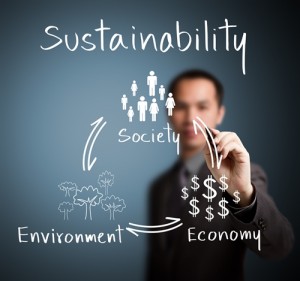Packing products often change to better meet the needs of the consumers purchasing them and the companies producing them.
Sustainable packaging isn't a new concept in this light, but it's increasingly gaining interest as both markets aim to find better solutions to some of their issues.
Plastics News reported that one company, Tetra Pak Inc., recently launched a new campaign that reinforces the importance of responsible material sourcing and development when it comes to consumer product goods. This "Moving To The Front" effort is said to place a focus on using renewable resources to protect limited resources on the Earth.
This campaign is targeted at many companies that have personal stakes in the market. These include suppliers, manufacturers, brand owners, non-governmental organizations and several other industry players in an effort to expand focuses from the middle and end of packaging lifecycles to the beginning.
Tetra Pak itself is a supplier of shelf-stable aseptic packaging and processing equipment, materials made from paperboard, polyethylene and aluminum foil. The company itself is also using bio-based plastics for caps and film in production.
"As we have always seen it, renewability, which is using a resource that can be regrown or replenished naturally over time, such as paperboard-based packaging and bio-based polyethylene, can have a positive impact on our global economic stability and the ongoing health and biodiversity of our planet," said Elisabeth Comere, the Vernon Hills, Illinois-based director of environmental and governmental affairs for the company.
New strategies include new materials
Packaging Digest noted that one company's strategy for introducing better supplies in its production cycle is to use new materials. Hovis Ltd.'s Seed Sensations bread bag is made almost entirely from renewable polyethylene. This material provides a 75 percent reduction in carbon footprint as compared to traditional bread bags made from plastic and non-renewable fossil resources.

To celebrate the launch of this new product, Hovis plans to communicate its Carbon Trust certification by having an on-pack flash. This will help to communicate the lower carbon footprint and commitment to sustainability for the company.
"The Hovis brand has always stood for goodness and healthy products. From its launch, we have focused on the nutritional benefits of the wheatgerm," Richard McQuillan, the company's marketing manager, told the news source. "When Amcor presented the renewable PE project to us, we saw an obvious fit for Hovis as we look for ways in which we can reduce environmental impacts through packaging format changes."
The company will likely move more of its bread products over to the new bread bag in the near future.
Other companies using new packaging
Fruit Net added that another company is working to develop products using new materials as well. Organic fruit and vegetable specialist Nature & More recently introduced new sustainable packaging derived from sugar cane. The material is similar in appearance to fine cardboard, and as it's made of waste material, it's easily compostable and plastic-free.
"We are now selling organic vine tomatoes, pears and physalis packed with the sugarcane materials and our customers are very pleased with the first results," said Nature & Mor packaging expert Paul Hendriks. "I feel that we have taken a major step in packing innovation."
The company is now in the process of replacing many of its old trays, tags, labels and stickers with these new materials. One client for a company that has opted for organic materials in packaging like Nature & More said it did so because the new trays fit its anti-waste programs.


